As you are most probably aware by now, the island of Rhodes has had its fair share of war in the years gone by. It has had to bear The Ottoman Military strength in sieges that have lasted months each time. One of the most fierce opponents of Rhodes was Suleiman The Magnificent -The 10th Sultan with the longest tenure of The Ottoman Empire.
He was the authority figure from 1520 until 1566 (his death).
Suleyman Bin Salim – Suleiman The Magnificent
Born Suleyman Bin Salim in November 1494 in Trabzon (North East Turkey), he went by many names. People knew him as Suleiman The Magnificent, Suleiman The Lawgiver, Kanuni Sultan Suleiman (Kanuni meaning Canon), and Suleiman The First.
At just 7 years old, he went to Constantinople (today known as Istanbul) for his studies. He studied History, Science, Literature as well as military warfare and tactics.
After his studies were complete, Suleiman went on to become an outstanding Commander for The Ottoman Empire and was in control of the force’s economy and military.
Suleiman The Magnificent went on to dominate most of Europe during his reign. He carried out sieges against Hungary, Africa, the Middle East, Belgrade and throughout the Mediterranean and of course, this included Rhodes.
His purpose was to take over the Christian holds all around Europe.
OK, given the deep involvement in Suleiman’s campaigns, we will focus here on his activities in Rhodes.
If you want to know more about him and his other conflicts, please see the Suleiman The Magnificent Wikipedia Page.
Suleiman The Magnificent’s Siege Of Rhodes

باسم, CC BY-SA 4.0 https://creativecommons.org/licenses/by-sa/4.0, via Wikimedia Commons
It was during the Summer period in the year 1522 that Suleiman The Magnificent made his move on the island of Rhodes. He dispatched an army of 400 ships and 100,000 men to carry out the siege.
The Ottoman Statesman named Coban Mustafa Pascha commanded the 400 ships sent ahead. The Sultan himself followed with his army just over a month later with his powerful soldiers to take personal control.
He also had carried out the reconstruction of Marmaris Castle in the Mugla Province in Turkey and used this as his base of operations for the conflict.
Initially, The Turks carried out attacks on a daily basis and they also secured the harbor area. Despite massive efforts, they struggled to breach the fortification walls of the old city.
A few weeks later, with the help of explosives, they blew a 10-meter plus hole in the wall, causing a major collapse.
Naturally they attacked this now weak area with soldiers, but The Knights were able to defend and drive them back again. In the same day, The Ottomans tried twice more to break through the line of defense, but again, The Knights defended.
Suleiman The Magnificent & The Execution Order
From here, and a few days later, Coban Mustafa Pascha ordered a second offensive charge on the city. This fighting continued for most of the day, and once again, it met with fierce resistance. Suleiman finally called off the attack.
Furious that the city was still not captured, he ordered the execution of Coban Mustafa Pascha for his failure to perform his duties. He eventually dropped this order after many officials implored him to reconsider.
Despite revoking the execution order, he replaced Coban Mustafa Pascha with the very qualified Ahmed Pasha, who took charge of further attacks and developed a strategy to breach Rhodes City.
Yet again, The Knights and Soldiers held off further attacks. By the end of November 1522, both sides were drained and weakened. The Knights did not have the strength or the backup to keep fighting, and the Ottomans had suffered a lot of casualties in battle.
Suleiman then made a decision to offer a deal to the local citizens of the island. He promised them food and would allow them to live if they ceased to resist. If they were to refuse this deal, then death would follow or even slavery.
Suleiman The Magnificent’s Terms Are Met
The local citizens then looked to The Grand Master Villiers de L’Isle-Adam to arrange negotiations. On the 11th of December, for two days, they allowed a period of talking and a reprieve from fighting. During these talks, the local people put on more pressure to ensure their safety. This infuriated Suleiman and he ordered his soldiers to continue with the siege.
Only four days later, with a large percentage of the walls lost, the city was ready for capture. Again, under pressure from the locals, Villiers de L’Isle-Adam felt forced to request another reprieve.
Finally, the terms set by Suleiman were met. They were considered quite reasonable by the people of Rhodes and outlined the following.
- Suleiman told The Knights Of Rhodes to leave the island within 12 days.
- He allowed them to take Weapons and Armory with them.
- He offered other islanders a time period of 3 years to leave the island.
- A promise made not to destroy or convert any Churches into Mosques.
- Those remaining would not be subject to Ottoman Tax for 5 years.
Just little over a week later on New years Day 1523, The Knights Of Rhodes left the island with their flags held high accompanied by thousands of locals. They made use of 50 vessels that had been made available to them and left for Crete.
After the departure of The Knights, Suleiman went back on his promises. He had thousands of the local civilians slayed and started the process of pillaging and destroying/converting the local Churches into Mosques.
Watch This Amazing Video On Suleiman And His 1522 Siege Of Rhodes
Suleiman The Magnificent: Later Life And Death.
It was in January 1566 that Suleiman The Magnificent would play out his last role. The Siege of Szigetvar (Southern Hungary) was fought between August 5 and September 8 and there were heavy losses on both sides.
Both Leaders of the two Armies died during the conflict. Zrinski died during the final charge, and Suleiman died from natural causes two months before is 72nd birthday.
His body was returned to Istanbul after the Ottoman Victory where he was buried. Because the journey home was long, very hot and far, his liver and heart (as well as other organs) were removed and buried jut outside Szigetvar before the journey home commenced.
The Mosque Of Suleiman In Rhodes
After The Knights had left the island of Rhodes, Suleiman had his Mosque built in
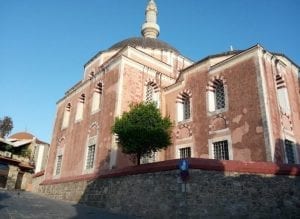
order to monument his victory.
It was originally constructed in 1522 and it was rebuilt in 1808.
The Ottoman Empire converted a lot of churches on the island into Mosques, and this was the first.
It is a fabulous construction and you can not miss it. The outer walls are painted pink and it is located at the top of Socrates Street (Sokratous in Greek) in The Medieval City Of Rhodes. Only 2 minutes away from The Palace Of The Grand Masters, it is a beautiful setting and a location not to be missed if you are visiting the island.
In Conclusion
So, as you can realize, The Sultan Suleiman was a powerful and strong leader. He has certainly left his mark on the island of Rhodes. The Siege Of Rhodes in 1522 will long be remembered.
Although a powerful and respected leader, he also brought a lot of harm to many. War is war though, would you agree? Or not?
I would love your opinions and thoughts on this. Although Suleiman will stand out in the history of The Ottoman Empire, I am sure many of us have conflicting opinions.
Please leave me a comment and I will get back to you.
Click From Below To Learn More About Some Important Historical Figures In Rhodes




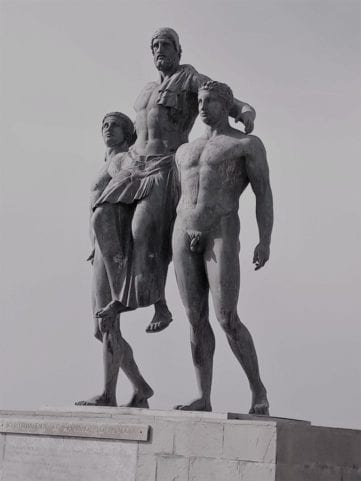

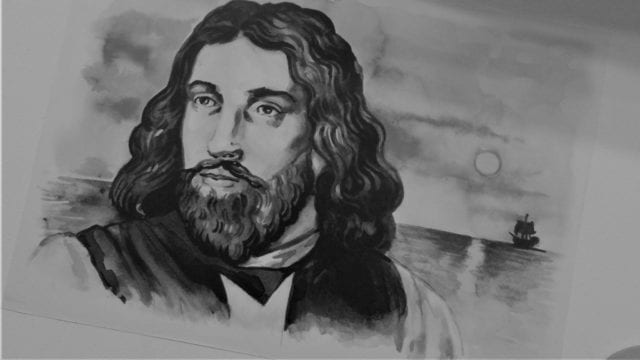
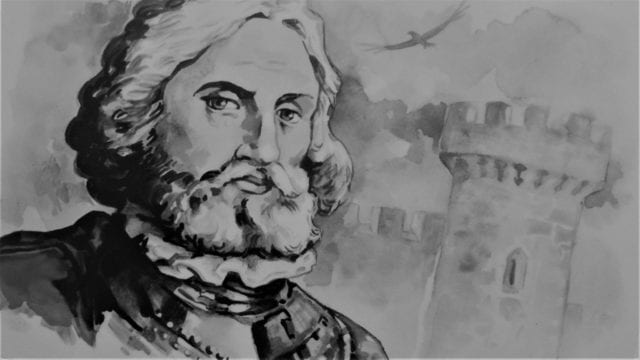
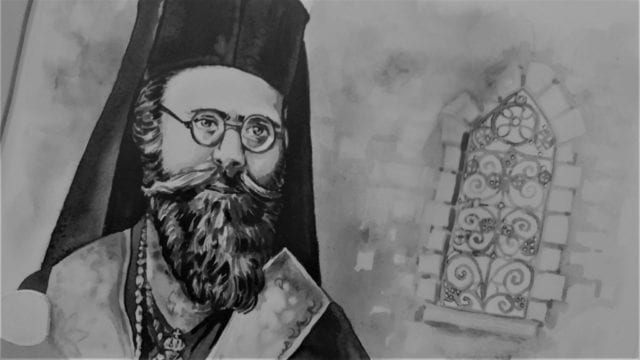
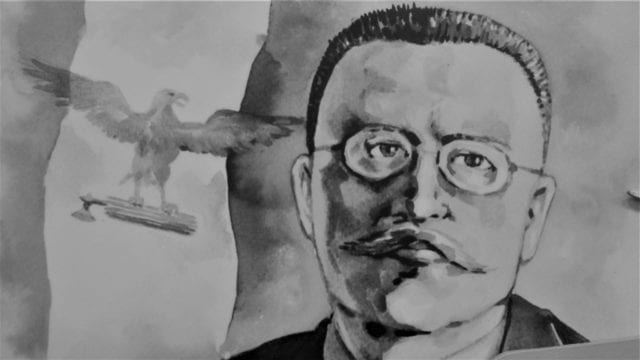
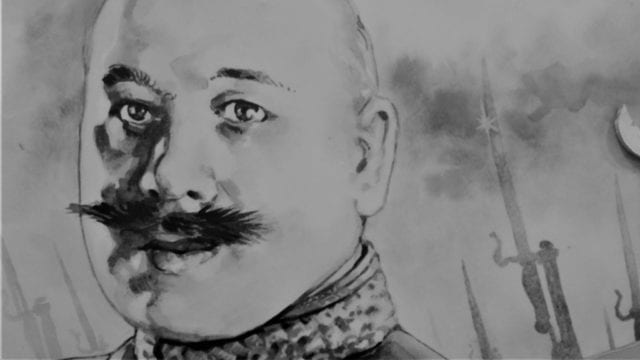
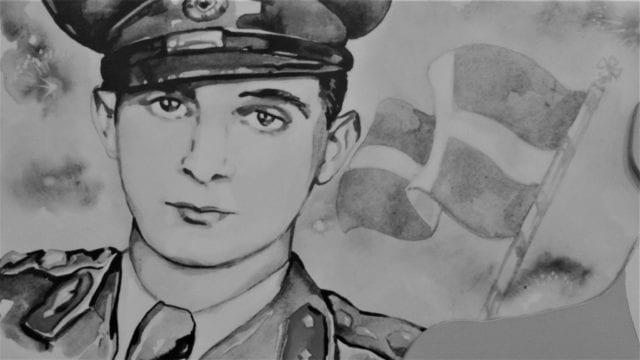
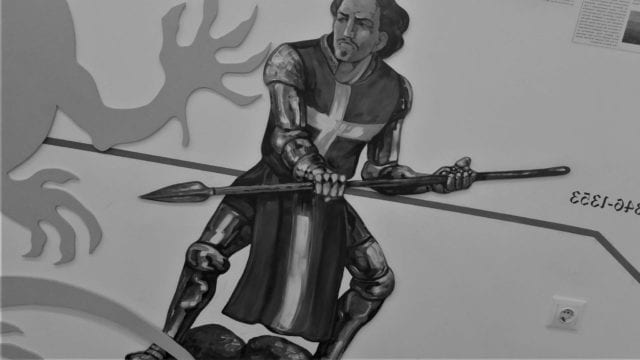
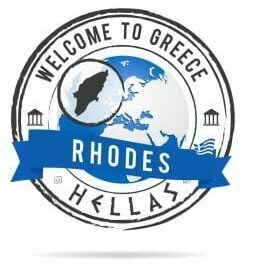
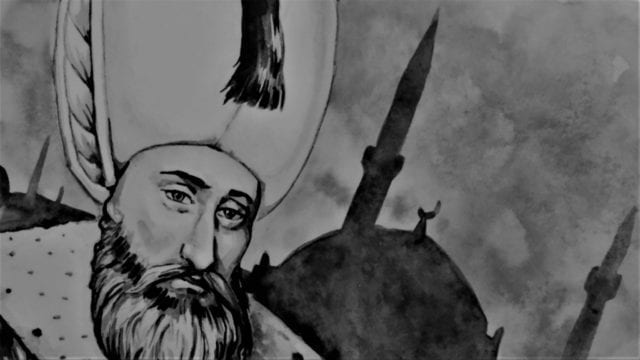
Great article Chris. I heard about Suleiman and I even learned about him in high school. He indeed was a great leader and warrior but just like you said he also harmed a lot of innocent people which is not fair. I have also watched a film about him and I would recommend all people to learn about him.
Thanks Daniel
I do not suppose you can remember the name of the film you saw? Or maybe provide me with a link to it?
Let me know!
Chris
The Sultan Suleiman, great leader or not, doesn’t sound like a very nice person to me. All he was interested in was gaining more land and power at the expense of so many lives.
On top of it all, he didn’t even keep all his promises that he made to the locals and ended up destroying them as well as their churches.
In my humble opinion, there should be no great memorials built in memory of him, as he doesn’t deserve the fame.
Thank you for your point of view on this Michel.
Many people of course have different opinions, and although I agree he was maybe not such a nice kind of guy., there wars fought and the lives involved all make a fascinating history.
I think all of it needs to be remembered.
Thanks 🙂
Chris
Hey Chris, how lucky are you living on Rhodes?
Love the place and have visited there a few times. The last time we sailed a 48 ft Bavaria from the main town, into Faliraki and then on to Kos. I wanted to see what the place looked like, and all I can say is that it has changed beyond all recognition from the little town I first visited over 40 years ago!
I eventually moved abroad from the UK and now live in South Africa! Best decision I could have made – despite the UK having a decent summer for once 🙂
Keep up the good work, love what you’re doing.
Hey Les, yes I am very lucky to be here and living on Rhodes. There is not a day that goes by that I do not appreciate it.
It is great you were in the neighborhood too although it was many years ago, any plans for a future visit?
I know what you mean about the UK. I do not make comparisons and each person is to their own thoughts, but I will not return there. There are many reasons for this, and of course the weather is one of them 🙂
Thanks Les, nice to hear from you
Chris
Hello
There is also a TV series about Suleiman The Magnificent, I have learned more about his likes and his wife Hyrem from this series.
It also included the scene when Suleiman The Magnificent went to the island of Rhodes.
I am quite passionate about history (certainly Greek History) and I also enjoyed watching it in the type of a movie as it really brings it to life.
Hey there and thanks
Would you happen to have a name for the program you watched on Suleiman? I would love to see it too.
Let me know if you can
Thanks
Chris
It sounds like Suleiman The Magnificent was a Muslim who was responsible for killing Christians. Do you have an approximate number of Christian fatalities? Could you tell me what type of Muslim he was?
I love history and this is the first time I’ve heard of him. Did he promote commerce for his own people?
I see he was a liar when he went back on his word and killed the innocent people left on the island. That doesn’t make him “great” in anything, wouldn’t you agree?
Hello there and thanks for getting in contact.
Suleiman was considered a leader of Islam and also is said to be one of the perfect leaders in its history.
As for the siege of Rhodes, it is of course difficult to say how many people died from the different armies, but it is documented that over 50,000 people lost their lives in total.
During his term, he ordered the construction of many establishments and renovations. Places such as Jerusalem, Egypt and Morocco were all under his command and The Ottoman Empire prospered.
Although he went back on his word in Rhodes, the title ‘Magnificent’ is not to be confused with his actions. I agree going back on his word was not a good thing, but the title Suleiman The Magnificent was actually given to him from Europe. This was due to the fact that his time in office was during the golden period of the Empire.
Thanks
Chris
It’s so great to get a history of a place before you visit, it somehow makes everything more magical. I have wanted to visit the Greek Isles for a long time and your site is a wealth of information. Can’t wait to visit!
Information here like The Siege Of Rhodes really brings home events that have taken place in Rhodes.
So much to do, see and learn! You’ve really got me sold!
Hi Susanne
I agree with you. It is important to pay attention to the history of a location that you visit. It is all well and good enjoying the sun, sea and sand, but the history is what it is all about. If it was not for past events, places like Rhodes would maybe not even be known today.
Important people such as Suleiman, Pierre d’Aubusson, Philippe de Villiers de L’Isle-Adam and others have really had to take decisions which has shaped Rhodes as one of the most important historical locations in the world.
It is why people come here!
Thanks Susanne. I am happy you liked my website.
Chris
Suleiman must have thought that he was on this side of being God. People who give themselves many names must come across as highly self-centered.
Again, it’s amazing to think that such a small island as Rhodes would be such a great battleground to protect the Christian world. Theocratic as the Knights themselves might have been, they sound like an important force, in their time, to protect the future of the West.
Thanks for your thoughts Michael. Yes, Rhodes has certainly been the focus of many battles throughout history.
Suleiman’s efforts, although successful in 1522, was not the only attempt made to take the island by The Ottoman Empire. The siege also in 1480 is a massive even in the history of Rhodes.
The Knights were certainly a force, and they were never to be overrun easily.
Thanks my friend. Great to see you having a good look around the information. I noticed it is not the first comment you have left 🙂
Thanks very much!
Chris
Wow! I learned a ton of new information about Suleiman! I find it interesting that in his free time he loved writing love poetry! Do you know if any of his writings are still around?
By the way, I’ve always wanted to visit Greece! It’s definitely in my top 5 of places to visit before I die!
Thanks for making an awesome and informative website. Keep up the awesome work!
Hi Russell.
I will be honest and say I am aware that Suleiman was a man of words. He is known for some of his writings, quotes and essays. I will also be honest and say I have not come across any to read, nor do I know if you could get your hands on any of them with ease. This is something I will look into for sure.
Glad you liked the website. Let’s hope you manage to tick Greece off your top 5 in the near future.
Thanks for your comment.
Chris
Wow! Four HUNDRED ships??! It’s hard to believe that with THAT many ships and crew members they could not take the island. Either those knights were extremely skilled and led, the fort was incredibly durable and tactically built, or a strong, resilient combination of both! Still, it’s hard to believe…
Oh, but wait… a conquering leader went BACK on his promises??!!! Didn’t keep his word to the conquered??!! Oh, that NEVER happens throughout history. When will we learn?
So at this point, are there only mosques on the island? Were ALL the Christian Churches destroyed? Were any rebuilt??
Hey there and thanks for reading.
Yes, I mean Suleiman dispatched and personally led a huge army to try and conquer Rhodes. Eventually he was able to overcome his opposition, but it was not without fierce battles and massive losses on both sides.
Although he can be seen by some as a great leader and tactician, unfortunately he was one that went back on his word. Like you say, I think most leaders of today play the word game and say things they do not actually mean. That is another story though.
As for the mosques on the island, they were mostly taken away during the Italian occupation of Rhodes. Many were destroyed, some were rebuilt and other new constructions took place. The Suleiman Mosque still stands strong though an is worth seeing if you are ever on the island.
As of now, there are a lot of Orthodox/Catholic Churches on the island. I am told they stand in their hundreds spread all around from small to large. The most common is The Evangelismos Church and The St Francis Church both located in Rhodes Town.
I will be covering more information on the Churches and other constructions. More to come 🙂
Thanks for your interest. Nice to hear from you.
Chris
This is very interesting research on the island of Rhodes in Greece.
Its nice to see the video of the 1522 siege of Rhodes here. I have heard of Suleiman The Magnificent, but it was mostly from history classed in school.
I’ve never been to Greece but hope to visit one day. It would be interesting to see the places you show in the pictures here and see for myself where all this activity took place.
History is always so interesting.
Hi Janine and thanks for getting in touch.
I also studied the activities of The Ottoman Empire while in school, and the name Suleiman is no stranger to me either.
One I started living here though, and actually seeing the places that were once under siege with my own eyes, it gripped me. The history here on the island of Rhodes stands out so much, and it is hard not to take notice.
I wanted to know more about Suleiman and his army and I have made lots of visits to the area that was attacked all them centuries ago.
It is one thing to read it in books (although this is great) and it is another to stand where all of this history unfolded.
Definitely get yourself to Rhodes. You will love it 🙂
Thanks Janine.
Chris